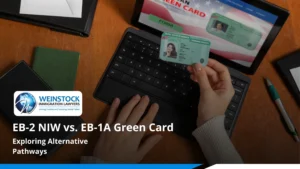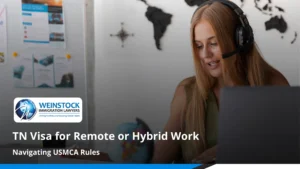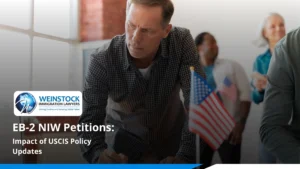Coronavirus Raises Tough Immigration Issues For Businesses
Coronavirus raises a host of difficult immigration issues for U.S. businesses, including the status of H-1B visa holders and international students, obtaining I-9 verification for new employees and travel restrictions that limit mobility for international personnel.
Below is a look at important immigration issues facing businesses during the current health crisis.
H-1B and L-1 Visa Holders: H-1B denial rates have reached historic highs during the Trump administration, according to a National Foundation for American Policy analysis. That raises crucial immigration issues if an H-1B petition is denied, particularly for an existing H-1B employee.
“Employees are in a jam. Many employers now prohibit domestic and international travel, and the U.S. government itself is discouraging travel to certain countries,” said Lynden Melmed, a partner at Berry Appleman & Leiden (BAL) and former chief counsel for USCIS, in an interview. “But the employees violate immigration laws if they stay put after an H-1B petition is denied. U.S. Citizenship and Immigration Services (USCIS) could fix this by instructing officers not to deny cases for workers in the U.S. unless there are serious violations of law. USCIS could also make it easier for companies to reapply without forcing the employee to leave the United States.”
BAL has recommended, if an employee becomes out of status, to consider refiling the H-1B petition and asking USCIS to excuse the failure to maintain status based on COVID-19 preventing the employee from departing the country. BAL notes, “A request will be stronger if the company can document that the employee would have been required to travel to a country where COVID-19 is widespread or if the individual or family members are at a greater health risk.”
One positive development for companies: BAL has confirmed with USCIS that the agency does not plan to conduct site visits at company office locations that have closed due to coronavirus.
Some employers may be uncertain how switching to remote work may affect the status of an H-1B or L-1 visa holder. “For an H-1B employee, an amended petition or LCA [labor condition application] should not be required as long as the employee is working in the same capacity and within typical commuting distance of the work location on the original petition and LCA,” according to William Stock of Klasko Immigration Law Partners. “For L-1s, as long as they are temporarily working from home, in virtually the same capacity, an amended petition is not required.” L-1 visa holders denied an extension face similar dilemmas about leaving the United States as H-1B visa holders.
What would be a policy solution for H-1B visa holders who have reached their 6-year limit? “For H-1B visa holders who have ‘maxed out,’ a possible solution is a period of voluntary departure for 30 days for all employees whose nonimmigrant status is expiring within that time, similar to what has been done for the Electronic System for Travel Authorization, under which it is called ‘satisfactory departure’ and is limited to 30 days,” said Stock. “Persons with voluntary departure would not have employment authorization (unless separately granted in individual cases), but they would remain lawfully present in the United States for the period granted. USCIS would be protecting people from the future consequences, such as visa ineligibility, of what would otherwise be unlawful presence in the United States.”
The difficulty in gaining appointments at U.S. consulates means companies may want to consider switching to USCIS processing for L-1 petitions for intracompany transferees, note attorneys. “Many U.S. consulates worldwide will cancel nonimmigrant and immigrant visa appointments beginning March 16 and until further notice, including consulates in India, Paris, Dublin and Madrid,” according to the Fragomen law firm. “Once consulates resume normal operations, applicants will be able to reschedule appointments. Further cancellations and other reductions in consular services are expected in the coming days.”
International Students: “It is important that F and M students maintain their nonimmigrant student status, even during emergency events,” Immigration and Customs Enforcement (ICE) said in a recent statement. ICE directed students to “work with employers to maintain practical training agreements.” The statement added, “Changes to workplace requirements may impact nonimmigrant students engaging in practical training. SEVP [Student and Exchange Visitor Program] encourages such students to consult with their employer to seek alternative ways to maintain training agreements, such as teleworking or other arrangements.”
For universities and international students, ICE said in a March 9, 2020, message it intended to be flexible during the current academic year: “SEVP recognizes that the COVID-19 crisis is fluid and rapidly changing. For that reason, SEVP is not requiring prior notice of procedural adaptations, leaving room for schools to comply with state or local health emergency declarations. However . . . SEVP must be notified of procedural adaptations within ten business days of the change. This guidance applies to students who are currently enrolled in a program of study and is not intended for new or initial students who are outside the United States.”
I-9 Verification: “Where an employer is forced to shut down onsite operations due to COVID-19, there are two options related to I-9s [the federal form used to verify a new employee’s identity and employment authorization],” said Michael Neifach, office managing principal of the Washington, D.C. Region office of Jackson Lewis P.C. and a former general counsel of ICE, in an interview. “First, have the new hire complete section 1 of the I-9 remotely and designate a third party as an employer’s authorized agent to verify the documents and complete section 2 of the I-9.” Neifach notes the employer remains liable for any errors made by the authorized agent.
“The second possibility is to have the new hire complete section 1 of the I-9 remotely, and then hold off completion of the I-9 until operations resume and section 2 can be completed by the employer. However, that option is less certain,” said Neifach. “This is not a cure for a late I-9 but may be a basis to mitigate against future sanction or penalty should there be an ICE audit. The employer will need to clearly document the reasons for the delayed completion of section 2 in a memo to maintain with the I-9.
“While ICE has not explicitly blessed this option for delays due to COVID-19, in the context of other natural disasters like Hurricane Katrina, the government has advised that employers whose Form I-9s are missing and/or destroyed as a result of a natural disaster should complete a new I-9 as possible and attach a memo stating the reasons why it was redone or completed late. While the government continues to maintain that section 2 of the I-9 cannot be done by reviewing scans or photos of verification documents, it may be helpful in documenting the employers overall good faith efforts in asking ICE to mitigate and excuse the otherwise late I-9.”
Options for International Personnel: If an employee needs to come to the United States but has been in a country currently facing one of the administration’s coronavirus travel restrictions – as of March 13, 2020, these countries included China, Iran and European countries in the Schengen Area (Note: As of March 31st, 2024, Bulgaria and Romania have officially joined the Schengen Area, increasing the number of participating countries to 29. This change leads to the implementation of Schengen rules, including visa issuance and the removal of internal air and sea border controls, in both countries, according to SchengenVisaInfo.com.)– then one option might be for the individual to travel and remain in a country not subject to the U.S. travel restrictions.
In theory, going to another country could allow an employee to pass the 14-day period designated in the travel ban. However, the challenge is the travel ban could be broadened to include new countries. During his March 13, 2020, press conference Donald Trump suggested the ban could extend to the United Kingdom – and the next day Vice President Mike Pence announced the ban would, in fact, be expanded to the U.K. and Ireland.
Coronavirus does not respect borders. Companies will need to address the immigration issues coronavirus has created or risk making a bad situation worse.
Original Source: Forbes
Related posts

Exploring Alternative Pathways: EB-2 NIW vs. EB-1A Green Card
Summary Two of the most sought-after green card options for highly qualified professionals are: EB-2 National Interest Waiver (NIW) EB-1A Extraordinary Ability visa Both allow

TN Visa for Remote or Hybrid Work: Navigating USMCA Rules
Summary If you’re a Canadian or Mexican entrepreneur living in the U.S. or planning to launch a business here, you may be wondering: Can I

Impact of USCIS Policy Updates on EB-2 NIW Petitions: What You Need to Know
Summary The EB-2 National Interest Waiver (NIW) offers a pathway to U.S. permanent residency without employer sponsorship, ideal for professionals and skilled workers. Recent USCIS
